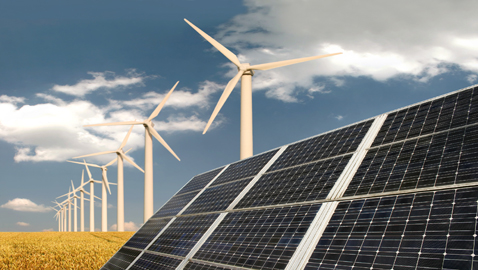
India’s renewable energy sector is likely to generate business opportunities worth $160 billion in the next five years, according to the Economic Survey 2014-15.
The Economic Survey is a flagship annual document of the Ministry of Finance that is presented to both houses of Parliament during the budget session. It reviews developments in the economy over the previous 12 months, summarises the performance of major development programmes, and highlights the policy initiatives of the government and the prospects of the economy in the short to medium term.
The current Economic Survey has estimated the business potential of the country’s renewable energy sector based on proposals that are lined up for the next five years.
India’s immediate plans for renewable energy include scaling up cumulative installed capacity to 170 GW.
The Jawaharlal Nehru National Solar Mission was launched in January 2010 with the objective of deploying 20,000 MW of grid-connected solar power by 2022, and in the process establishing the country as a global leader in solar energy. The 12th Plan financial outlay for the scheme totals Rs.8,795 crore. JNNSM is now being scaled up fivefold to 100,000 MW by 2022, which will require an additional investment of $100 billion.
In addition to scaling up renewable power installed capacity, the government also plans to set up a National University for Renewable Energy.
The Economic Survey said that the Indian renewable energy sector offered very good opportunities for setting up as well as scaling up operations, leapfrogging technologies and creating volumes.
The country’s total renewable power installed capacity as on December 31, 2014, stood at 33.8 GW. Of this, wind energy accounted for 66 per cent share followed by biomass, small hydropower and solar power.
In 2013-14, India’s solar power installed capacity was 2,647 MW. As per Census 2011, around 1.1 million households use solar energy to meet their lighting needs. A similar number of people in the country rely on energy from biogas plants for cooking.
The renewable energy sector in India is driven primarily by the private sector. The government has been promoting private investment in the sector through a mix of fiscal and financial incentives. The incentives include capital/interest subsidy, accelerated depreciation, and nil/concessional excise and customs duties. The level of capital subsidy is dependent on renewable resources and region, varying from about 10 per cent to 90 per cent of project costs. Besides the incentives, preferential tariffs are being provided at state level.
Citing a Bloomberg New Energy Finance/United Nations Environment Programme report, the Economic Survey said the country’s renewable energy sector had attracted a total investment of $6 billion in 2013.











